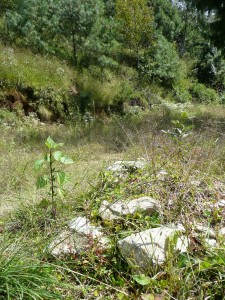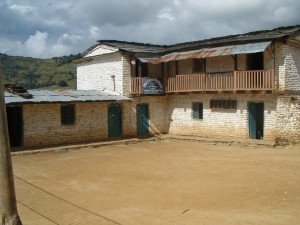You have read about two of the most influential people in Mahabir Pun’s life, his parents Kisna and Purbi. Visualize them always in the background of this young boy’s life as you read more about his early educational years in Nangi.

All that remains of the original one story school is a few stones and a flattened grassy area that cradles the memories and promises of a brighter future. The building was dismantled and the materials used to build the present school before Mahabir returned to Nangi.
Mahabir attended school as a young child, his father insisted on it, but school back in the 1950’s and 1960’s was a loose affair. According to Mahabir most villages did not have schools. You didn’t need a building to have a school; you just needed someone who would volunteer to teach. If no one took the initiative there was no schooling. Nangi and Ramche, the neighboring village, had schools. In Nangi there was a small one story building on the hill just above his home that served as the “school”. There were no formally trained teachers. According to Mahabir, community members who could read, write and speak English volunteered their time to teach in the schools. Village elders, mostly retired Gurkhas, taught the basics of reading, writing, mathematics and science. This building was used only during the summer. He could walk to the school easily during the summer yet be available for working in the fields when needed. One year they decided to run the school from 6-9 pm at night so during the day the children could work in the fields cultivating and harvesting the main crops of potato, corn, millet and barley along with their parents. During the winter he walked two hours to the Ramche valley and sat on the ground for school because they had no building.

Part of the early Himanchal Higher Education School built from the reclaimed original one room schoolhouse. You are looking at the 5th grade classroom to the left, office and teachers meeting room on the right.
Mahabir told me: “in a sense it was a school but not a real school because there were no books, no textbooks, no pencils or paper…informal we learned.” Using charcoal from the cooking fires he would rub a wooden board with the blackened chunks to create a sort of blackboard. Then with a soft white stone he would write on the board to practice his vocabulary and numbers. Everyday he would need to coat the board with a new layer of charcoal powder. The stone he used to write with was soft and like talc, almost like chalk. He and his classmates would have to walk a half-day to a large rock in the mountains near Basanat Village and harvest chunks of the white rock. My research leads me to believe this is a type of mineral called talc which is found in the Himalayas. It is the softest known mineral and we know it as talcum powder but it does have a slightly greasy characteristic which would hold up for writing.
Mahabir learned in the only environment he knew but what would happen to modern day school children if you not only took away their electronic devices but also their paper, crayons, chalk, pencils, pens, textbooks…if all they had to learn was their eyes, ears and minds to listen and think? Share your comments with the rest of your fellow readers by clicking on the speech bubble in the upper right corner of this post. I’m really interested to hear what educators have to say. Come back next week and read about Mahabir Pun’s grammar school days.
